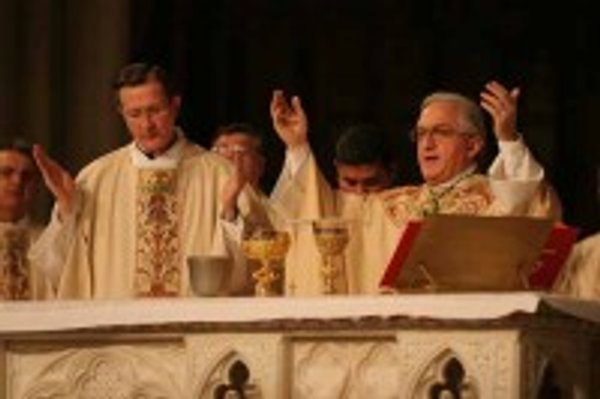Below is the text of Archbishop Migliore's homily from June 26, 2008.
According to some experts, children go through four stages of dealing with their fathers. In stage one, they call you da-da; in stage two, they grow and call you daddy. As they mature and reach stage three they call you dad. Finally, in stage four they call you collect!
In today’s second reading from the letter of St. Paul to the Romans, we have that beautiful passage wherein he says that we have “received a spirit of adoption, through which we cry, ‘Abba, Father!”
There is much confusion today about fathers and their proper role in the family. This has led many to think that the mystery of God as Father is a mere human projection. But it is exactly the opposite. Fatherhood is a concept that we get from God. Saint Paul says: “I kneel before the Father, from whom all earthly fatherhood in heaven and on earth is known” (Eph. 3:14-15). The more we understand God as Father, the more we will understand human fathers.
In Roman times, adoptions were often done for a sonless father. There was a ceremony performed where the adoptive father takes the clothing off his newly adopted son and puts new ones on him to symbolize his joining a new family.
Likewise, for us. We are born into a natural family but are made children of God, and therefore, heirs of God, when we are adopted into His family in Baptism. And within the baptismal ceremony there is also the clothing with the white garment symbolizing that we have put on Christ and are now children of God.
One of the stories told of St. Francis of Assisi mentions a dramatic, and at the same time, humorous episode. Pietro Bernardone, Francis’ father, thought that his son was losing his mind. So, he dragged him to see the Bishop of Assisi in order to have the Bishop admonish Francis to obey his father and assume a business career. Because Mr. Bernardone knew that what –as we would say today- was in the best interest of his son. All of a sudden, Francis removed all his clothing and remained undressed in the presence of the Bishop and his father. This was a radical gesture to symbolize that his divine filiation prevailed over human filiation.
This reminds me of an anecdote recounted by Scott Hahn in his book, Ordinary Work, Extraordinary Grace, wherein he tells of a young priest giving a meditation at the Opus Dei center in Rome. Unbeknownst to him, Msgr. Escriva was present in the back. At a certain point in his meditation, the young priest said: “The spiritual foundation of Opus Dei is humility.” Then seemingly out of nowhere, a firm and fatherly voice came from the back of the chapel: “No, it’s not!” And out of the shadows came Fr. Josémaria who gently corrected the young priest by saying it’s not humility, rather, it’s divine filiation. If we are in Christ, we have been infused with an eternal sense of hopefulness.
This divine filiation makes us heirs of God. Heirs of God’s gifts, which are gifts of the Holy Spirit. We know that the Holy Spirit’s gifts are wisdom, understanding, counsel, fortitude, knowledge, piety, and fear of the Lord.
We don’t need to be very astute observers to notice that we live in a world that struggles against hopelessness. If you talk to people, you may get into a conversation with someone who is going to tell you that they are discouraged and cynical about life. On a world scale, it seems that we go from crisis to crisis. In our personal lives there is pain. All this can lead to a loss of hope.
Two months ago Pope Benedict came to the States and the United Nations bringing with him a very simple, basic, but powerful message: “Christ our Hope.”
After his magisterial speech in the General Assembly of the United Nations, the entire hall gave him a long and warm standing ovation. Some observers found that ovation somewhat hypocritical. Because -they maintained- when it comes to passing resolutions or outline plans of actions those same Ambassadors act in just the opposite way of what the Pope stood for. Though it’s true that the Assembly too often deliberates in discordance with the Pope’s proposals, there is no doubt in my mind that that ovation was sincere. Because that was a moment of truth. Those diplomats had the impression that the Pope was reading their heart of their personal desire for justice and freedom, so they felt valued in their personal dignity and activity.
The Pope was carrying a message of hope and he started by creating that same hope in everyone’s heart, just as Jesus did in his three years of public life in Judea, Galilee and Samaria. He opened hearts and minds to the hope found in God. God did the rest.
This is exactly what St. Josémaria did in his entire lifespan. He opened new horizons of hope for many, many people. For each and everyone of you here this evening. He introduced and lead each and everyone of you to God. God did and is doing the rest.
In this Mass let us thank the Lord for having given us St. Josémaria Escrivà de Balaguer: for the charism that was entrusted to him and through him to all of us – the charism of divine filiation.
Let us ask for determination, strength and serenity to carry out our personal and communal holy journey. Let us ask for light and joy so that the charism of St. Josémaria may bear fruit.
